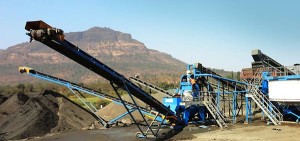 MAAD Minerals & Mines have recently introduced a new washing plant from CDE which is producing manufactured sands from basalt.
MAAD Minerals & Mines have recently introduced a new washing plant from CDE which is producing manufactured sands from basalt.
Located near Mumbai, MAAD are one of the leading construction and property development companies in the region. Mumbai has recently seen the Government introduce a ban on the mining of natural sand from rivers in an effort to protect the natural environment. This initial decision was challenged in the Mumbai High Court where the Government’s decision was upheld which has had a significant impact on the construction industry in the region.
Chiranjib Banerjee, Sales Manager with CDE Asia says “A large proportion of the sand used in construction throughout Mumbai and the surrounding area was mined from river beds prior to the Government’s ruling. When you take the ban on this practice in the wider context of a shortage of alternative natural sand resources in the area the construction industry was faced with a major problem.”
The shortage of alternative natural sand reserves in the Mumbai area led to a requirement for this material to be imported from neighbouring states that do not face the same shortages. This has led to increased transport costs for those manufacturing building sands for concrete, plastering and mortar.
Production costs have further increased as a result of the requirement for building products manufacturers to buy processed sands rather than being able to utilise their own processing facilities to produce their own material. This has resulted in a large number of construction companies not being in a position to maximise the efficiencies from the vertical integration strategies they have implemented in recent years.
A substitute for natural sand
Faced with this changing situation MAAD Mines & Minerals began looking at alternatives which would allow them to continue to produce the construction sands they require for the commercial building activities conducted through their Real Estate division.
“We began to discuss with MAAD the potential for using manufactured sands as a substitute for natural sands” explains Chiranjib Banerjee. “Crushing alone would not produce a manufactured or ‘engineered’ sand of sufficient quality due to the high proportion of minus 150 micron material in the feed material. We were able to present many examples of similar projects we had completed where manufactured sands were being successfully used as a substitute for natural sand following the introduction of our wet processing systems.”
The processing of crushed rock, quarry dust and scalpings to produce sand products with a range of different applications is an area where CDE have developed significant experience in recent years. “Initially our focus was on the washing of quarry dust – stockpiles of what was perceived to be a waste product – and the conversion of this material to washed sand primarily used as a natural sand substitute in the manufacture of concrete” explains Manish Bhartia, Managing Director at CDE Asia. “These systems were first introduced by CDE over a decade ago in Ireland and the UK and we now have similar plants producing manufactured sands from crushed rock material throughout Europe and Africa as well as here in India.” According to Mr Bhartia these systems cover a wide range of different rock types including limestone, basalt, granite, gabbro and tillite.
The new system
In this instance MAAD Mines & Minerals were producing a crushed basalt product from their Vertical Shaft Impactor (VSI). This was subsequently sent to a dry screening phase and the underflow from the screen is delivered to the CDE manufactured sands washing plant.
The EvoWash system supplied by CDE is a dual sands washing plant which will produce both concrete sand (coarse) and plastering sand (fine). “The vast majority of production time will be spent producing the two different sand products but occasionally the requirements change depending on the nature of the construction projects being worked on or the demands of MAAD’s customers” explains Rajib Mitra, Senior Technical Manager at CDE Asia. “One of the key requirements from the outset of the discussions with MAAD was how we can set the new plant up to provide the level of flexibility they require.”
These requirements are met by ensuring that the EvoWash can also produce a single plastering sand or concrete sand in larger quantities as required by the customer. When set up for dual sand production, or for production of a single concrete sand, the feed to the EvoWash system is 0-5mm. When the requirement is for a single plastering sand the feed to the CDE EvoWash is 0-3mm. Both of the sand products are produced in accordance with the requirements of IS 383 (Coarse & Fine Aggregates from Natural Sources for Concrete).
The washed sand product is typically less than 12% moisture content (by weight) which ensures it is suitable for use immediately. This eliminates the requirement for the final sand product to be stockpiled to allow excess water to run off. “Quick utilisation of the washed sand product is another success of this project as it ensures MAAD are able to respond quickly to demands for material both internally and from their customers. It also ensures that they are able to quickly generate revenue from their material” explains Rajib Mitra.
Commercial & Environmental benefits
MAAD Mines & Minerals believe that the new plant demonstrates that the ban on river mining of natural sand is not the hammer blow to operators that it was first perceived to be. This belief is supported by CDE Asia and Manish Bhartia comments “While the ban caused much initial concern in the industry it has forced the industry to look at how it can ensure supply of the required material from a sustainable source. When you evaluate the production of manufactured sands from crushed rock the environmental benefits are there for all to see. Elimination of the risk of damage to our natural environment caused by the mining of sand from river beds is the obvious advantage.” However, Mr Bhartia believes that the principal environmental benefit of the new washing plant also has a real commercial benefit for MAAD. “MAAD are now maximising product yield from their basalt crushing operations while also ensuring that the sand and aggregates they produce are of the highest quality. Effective removal of the minus 75 micron material from the final sand products has introduced efficiencies to concrete manufacturing operations through the delivery of a reduction in cement consumption.” All of these factors combine to ensure the most sustainable use of natural resources – while the commercial benefit is described as ‘maximising yield’ the corresponding environmental benefit is ‘minimising waste’.
It is often the case that any technology that comes with the ‘environmental’ tag is perceived as simply being an additional cost for those operating in the industry. This is something that CDE Asia are very keen to dispel says Manish Bhartia. “This project is one of many we have done that clearly demonstrates that environmental and commercial benefits can be derived from the introduction of the appropriate technology. Maximising yield or minimising waste – they are both the same thing.”
This theme is continued when we look at how the waste water from the EvoWash sand washing plant is treated on this project. An AquaCycle thickener receives the 0-75 micron material from the EvoWash hydrocyclone overflow. This is then dosed with a pre-mixed flocculant before entering the AquaCycle tank. The flocculant forces the very fine solids to bind together and sink to the bottom of the tank. The clean water meanwhile overflows a weir at the perimeter of the AquaCycle tank and is subsequently recirculated around the washing plant. This reduces the volume of fresh water to feed the washing plant by over 90%. This step ensures that the plant requires only 22m3 of fresh water per hour – without the Aquacycle thickener this figure would be 220m3 per hour.
The sludge at the bottom of the AquaCycle tank – which has a consistency of around 500 grams per litre, is subsequently discharged to a settling area located away from the main processing plant. Alongside the benefits from the reduction in the volumes of water required that the AquaCycle delivers there are a range of other benefits including the fact that remote storage of the sludge means valuable processing space is not taken up by waste storage. Waste volumes from the washing process are minimised which means that the space required to accommodate this waste is significantly less than if the AquaCycle was not included. There are also health & safety benefits in the removal of this waste from the area where site operatives and machinery are to be found.
Tried & Tested combination
According to CDE Asia the introduction of the EvoWash in partnership with the AquaCycle thickener is something that is increasingly popular. “It is now increasingly popular for the AquaCycle thickener to be included within the processing plants that we design which I believe is a sign that there is a growing awareness of the commercial benefits that accompany the obvious environmental advantages” explains Manish Bhartia.
This is a phenomenon that is being replicated on CDE installations throughout the world. “We now include some form of water treatment and recycling technology on close to 90% of all the projects that we undertake across Europe, Russia, Africa, Latin America, Australia and North America” says Peter Craven, Head of Marketing & Sales Support at CDE Global. “This figure increases year on year so the project experience we have in this area ensures we can maximise efficiencies in the transfer of material between processing phases and optimise the processing system to maximise product yield.” According to CDE the M2500 mobile washing plant that they produce is almost always specified with an AquaCycle thickener. “This is another popular combination as with the M2500 the feeding, screening, sand washing and stockpiling elements are all integrated on a single chassis meaning the space required is significantly less than has previously been the case. The mobility of the system is another influencing factor in its success” says Mr Craven.
Future trends
The ban on river sand mining in the Mumbai region is indicative of a wider trend throughout India – indeed this is being mirrored throughout the world. This presents a big opportunity for systems which can deliver high quality washed manufactured sands as a natural sand substitute. Whether the natural sand shortage comes from a ban on river sand mining or a shortage of natural sand within a particular area due to its geology, these systems offer operators a proven mechanism to increase the efficiency of their operations while at the same time maintaining the highest levels of product quality.
“We are benefiting now from all the research and development we invested in this area many years ago “explains Manish Bhartia. “Our project portfolio goes back over a decade and covers a range of different crushed rock types. It is this experience that enables us to deliver the results being seen at MAAD Mines & Minerals and being replicated across all of our manufactured sands washing plants.”
This is supported by Sandesh Mahale of MAAD Mines & Minerals who comments “We decided to introduce the best technology available for the production of manufactured sands and that is why we chose the CDE sand washing plant. CDE is a world renowned product for washing technology and their project portfolio is proof of this. We are delighted with the product quality and performance backed by their excellent support in process engineering and service.”
Further details on the range of applications for CDE equipment across construction, mining, specialist industrial sands and environmental applications can be found at www.cdeglobal.com. MAAD Mines & Minerals have recently launched a new company website at www.maadsandandbricks.com

